Grey-crowned rosy finch
pecking at scattered snowflakes,
first taste of winter.
For centuries amateur naturalists have kept field notebooks. These are excerpts from my own nature journal–a hodge-podge of observations, bits of natural history, questions to ponder, insights and experiences.
The summer sun pulls me outside in the early morning. My bare feet curl long strands of grass between my toes. It is the kind of morning that makes you want to lie down on that soft cushion of green and spend the day watching the clouds shape-shift in the sky. But the solid blue above is empty of possibility. The sun beats down and soon sends me inside sweating.
Relentless sky blue,
sungold, and verdant green mix,
make burnt sienna
Clear blue sky day after day. Banks of mud encrusted rocks rise from the shore. The heron moves closer to the middle of the river. I move to the center of the trail, my bare legs scratched by dry grasses. The breeze begins to stir as the sun moves past the zenith of the sky. Hot breath of air buffets my sun reddened shoulders. By afternoon, no rain, only wild gusts of wind to cool the land.
victorious over fire,
beheaded by wind.
With the wind comes clouds. Clouds heavy with rain, drop only lightening bolts. Sonic booms of thunder rattle the peace of evening, shaking the dessicated landscape. The next morning, I am again pulled outside as thunder gives way to the growl of low-flying planes. I scan the mountainsides, looking for thin tendrils of smoke. Another blue sky day.
Burning memories
held by hills, skeleton trees
watch the sky for rain.
The phone rings. Our hike to Bear Mountain has been cancelled. A fire has erupted and the lookout is evacuated by helicopter. The clear blue skies of are now filled with silver and red slurry bombers. The evening news shows maps speckled in red flames across the west. But an empty halo encircles Missoula.
Their bounty withheld,
oblivious to the drought,
evening rain clouds flame.
A month of relentless sunny forecasts. Still, the blue skies fade into a dirty brownish grey. Smoke rides the jet stream where storms used to blow in, from Idaho and Washington. I no longer am pulled outside as the heat withers every living thing and the smoke clouds the breath.
Once in late August
fire turns Montana black,
and the blue moon orange.
The grey shrouded afternoon quiet is shattered by the sound of the phone. A friend across the valley asks about the smoke plume. I look to the hillsides, but nothing. Then the distant rumble of sirens. It is not just the smoke that has made me hold my breath these last weeks. I walk to the bridge and look north down the river.
Clouds rise from mountain
to sky, river rises in
buckets to mountain.
An army of a hundred men in yellow nomex wield polaskis. Back breaking fire lines are built. Tankers bomb the hillsides rusty red. Luck does her part, calming the winds. The fire is surrounded. The teams go in for the final kill of any living coals. Then the green trucks come and whisk the firefighters away to new battle lines.
Forty two days dry,
droughts worsen, a record breaks,
but not the weather.
At last the sky is grey, the deep grey of heavy rain clouds, not the veil of dirty smoke over blue. The first drops falling from the sky smell like campfires. The ground seems to smolder as the drizzle hits the dust, sending up small wiffs. Two weeks of spattered rain storms and it’s over. Golden leaves are the only flames on the hillsides and the first snow extinguishes the season.
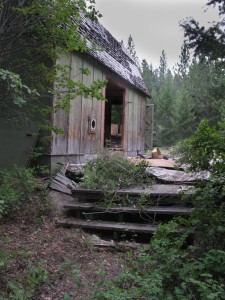 I have come to the homestead to escape my garden. For weeks now I have been harvesting and freezing and canning, putting by against the long winter. Here, by the old barn the leaves of the wild roses and the serviceberries are just starting to turn, the tips of the larch needles lighting up with a pale yellow glow and the berries on the kinnikinnick are juicy with red. It is mellow and peaceful here, away from the city where “the world is too much with us; late and soon/getting and spending we lay waste our powers.” ( Wordsworth)
I have come to the homestead to escape my garden. For weeks now I have been harvesting and freezing and canning, putting by against the long winter. Here, by the old barn the leaves of the wild roses and the serviceberries are just starting to turn, the tips of the larch needles lighting up with a pale yellow glow and the berries on the kinnikinnick are juicy with red. It is mellow and peaceful here, away from the city where “the world is too much with us; late and soon/getting and spending we lay waste our powers.” ( Wordsworth)
It is mellow and peaceful that is, until a great clattering arises from the barn. Small urgent feet scrabbling over loose boards, banging and thumping and then a high pitched squeal, the sound so long and sharp it keeps me nailed to my chair before it ends.
Silence once again and I move slowly to the barn door to peer in. At first I don’t see anything but the heaps of dried greenery and old boards in the packrat midden. Then a flash of movement out of the corner of my eye and I spot a long tailed weasel, his jaws in a vice grip on the neck of a lifeless packrat. His shiny little eyes are fixed on me and the moment I turn my head he lets loose his prey and scurries out of sight. I retrieve my camera and then stand at the door as still as possible, the lens aimed at the hapless packrat. I can see his massive nest-cache beyond, something silver and shiny peeking out from the foliage, a long string of red carpet thread, a brass coat hook, the pink puffballs of chewed up insulation and a half dozen cassette tape cases, the long streamers of shiny brown tape in ribboned tangles. It is months worth of gathering, harvesting all those branches of leaves, but also a strange hoarding of glittery, colorful baubles with no purpose.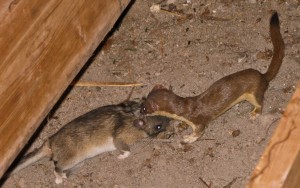
Eventually the weasel returns and I freeze in place, snapping pictures as the weasel circles, as if considering an engineering problem. He is smaller than the carcass. At last he latches on to the packrat’s neck and begins to drag the bounty away to the abandoned burrow of another mammal where he lives. There will be no caching and hoarding for the weasel though. He will feed on the packrat for at most a couple of days, then return to the hunt. He must eat a third of his body weight each day.
One last look at the abandoned packrat nest. I leave shaken, not by the violence of the small death I witnessed, but by the now useless nest and the life of the hoarding packrat. I drive back to my own overflowing nest of home.
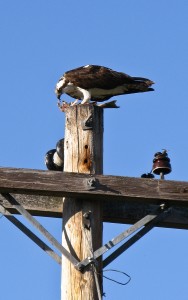 Perched on the thin cross-rail of the power line pole the osprey stands, silvery fish clasped in her talons, balancing on the slippery scales as she pecks and pulls at the stringy entrails. She is on the verge of a big change, a migration from the land where she raised her chicks in the big stick nest down the road.
Perched on the thin cross-rail of the power line pole the osprey stands, silvery fish clasped in her talons, balancing on the slippery scales as she pecks and pulls at the stringy entrails. She is on the verge of a big change, a migration from the land where she raised her chicks in the big stick nest down the road.
Her grown chicks circle over the river, diving awkwardly toward the water on barely tested wings. The larger one strikes the silver surface of the river, but he rises again with empty dripping talons. The mother osprey looks up from her meal, watches as the other chick makes a dive. He pauses, flailing on the surface of the river, thrashing his wings, but whatever he thought he’d grasped squirmed away and he returned to his slow circling over the water.
The osprey repositions herself on the fish beneath her, tilts a bit to the side as it seems to slip off the pole, but her grip is tight–her sharp claws dug deep in its flesh and balanced again, she thrusts her beak deep into the meat, ripping it from the carcass in great chunks, throwing her head up to let them slide down her gullet. She seems to be taking great pleasure in this solitary meal, no longer needing to regurgitate it for her chicks, confident that despite their awkward attempts , hunger would focus their skill.
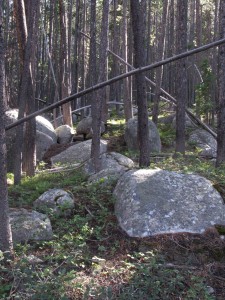 Crossing the glacial moraine that dams Racetrack Lake above Deerlodge, we make our way to the trailhead at the lake’s inlet. We are soon ascending through a hummucky, rock strewn forest of lodgepole pines. Sticks and stones won’t break our bones as we make our careful way up the trail, but climbing over deadfall and around the boulders will surely make our bones ache tomorrow morning. We are traveling through a forest of erratics–rocks resting far from the source, carried from the high peaks with their sharp ridges on a sheet of glacial ice and left behind as the ice age ended.
Crossing the glacial moraine that dams Racetrack Lake above Deerlodge, we make our way to the trailhead at the lake’s inlet. We are soon ascending through a hummucky, rock strewn forest of lodgepole pines. Sticks and stones won’t break our bones as we make our careful way up the trail, but climbing over deadfall and around the boulders will surely make our bones ache tomorrow morning. We are traveling through a forest of erratics–rocks resting far from the source, carried from the high peaks with their sharp ridges on a sheet of glacial ice and left behind as the ice age ended.
We too are a group of erratics, most of us from other places, brought here by jobs or dreams of living just a bit closer to the bedrock, seeking out a place where we might be surrounded by space and wildness rather than the press of other people and commerce. Only two or three of us grew up in the surrounding valleys and their stories of those ranching years and their knowledge of the flowers and birds helps ground the rest of us to our chosen homeland.
We think of rocks as steadfast and immovable, but each of these giant boulders is a monument to change. Born in a liquid fire, they were expelled from the earth’s crust by a force of unfathomable power, cooling slowly over time, then squeezed and crushed and molded by tremendous pressures, thrust up in the violent collision of tectonic plates and rising thousands of feet into the sky. Then they were sheared from their mother mountain by rains and freezes and broken by tons of glacial ice, scraping and filing their rough edges as they were carried down the mountain on the glacier’s back. Even when the ice melted and these erratics came to rest in what would, aeons on become a forest, their stories did not end. The seeds and spores of lichen and moss were brought by the wind from far-off places and began the slow process of burrowing down into the rock’s skin, breaking it apart, creating pockets of loose soil where grasses and then small bushes could get a foothold, maybe even a tree might reach its root tentacles down into cracks and crevices, feeding on the essence of the boulder.
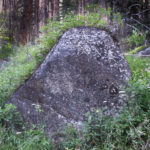 “Stone is the face of patience,” Mary Oliver says. Yes, these erratics are the face of patience, but their story is one of constant change, being shaped by powerful forces, no will of their own, no clinging to any one state, no concept of being a part of something bigger or broken apart from that, no sense of being a separate thing, no self. Only a patient yielding to impermanence. How can we imagine such a thing?
“Stone is the face of patience,” Mary Oliver says. Yes, these erratics are the face of patience, but their story is one of constant change, being shaped by powerful forces, no will of their own, no clinging to any one state, no concept of being a part of something bigger or broken apart from that, no sense of being a separate thing, no self. Only a patient yielding to impermanence. How can we imagine such a thing?
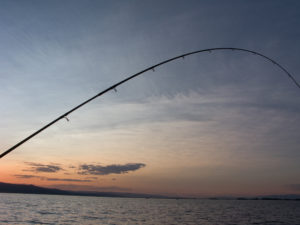 I am not a good fisherman. I would far prefer to sit on the bank reading a book about other people’s catches than stand patient in the icy cold water casting out again and again, getting frustrated by lines that fall heavily on the surface rather than sailing out in perfect arcs to land lightly in the still pool where the biggest lunkers lie. My fly gets caught up in bushes behind me as I try to cast forward and I spend an hour untangling the line from the willows of memory, rather than simply cutting it off and tying on another fly. I stumble on the slippery rocks of questions I don’t have the answers to and find my waders filling up with the water of confusion, weighing me down. Or my fly drifts away and gets tangled in the snag that washed up on the bank in last year’s flood of life experience.
I am not a good fisherman. I would far prefer to sit on the bank reading a book about other people’s catches than stand patient in the icy cold water casting out again and again, getting frustrated by lines that fall heavily on the surface rather than sailing out in perfect arcs to land lightly in the still pool where the biggest lunkers lie. My fly gets caught up in bushes behind me as I try to cast forward and I spend an hour untangling the line from the willows of memory, rather than simply cutting it off and tying on another fly. I stumble on the slippery rocks of questions I don’t have the answers to and find my waders filling up with the water of confusion, weighing me down. Or my fly drifts away and gets tangled in the snag that washed up on the bank in last year’s flood of life experience.
Don’t get me wrong–I get plenty of nibbles. Fish do rise to the surface and bite my fly. But I have such trouble setting the hook. I catch a glimpse of the silvery flash of scales–the rainbow colors of insight, but then they wiggle off the hook and slither away downstream, my line lying slack on the water’s surface. I am tempted to give up this silly sport. It is such a cliche anyway–a Montanan angling for fish and words. And yet…
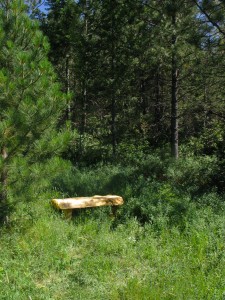 Bench snuggled into the shade of the Ponderosas. Looking out beyond the meadow to the mountain range across the valley. Openness, spaciousness, while feeling nested. I have always wanted a mountain view, always loved the aerial sense it gives me of my place in the world. A living topographic map laid out before me. My mind can wander those far off ridge lines–imagine itself climbing up the scree slopes of Petty Peak. It can dip down into the parked out forests of Ponderosa pine on the near slopes. Mounds of gravelly sand that once were beaches on Glacial Lake Missoula. My mind can conjure its watery surface creeping up the sides of the valley, shaping sand bars and inlets as it rose and fell over eons.
Bench snuggled into the shade of the Ponderosas. Looking out beyond the meadow to the mountain range across the valley. Openness, spaciousness, while feeling nested. I have always wanted a mountain view, always loved the aerial sense it gives me of my place in the world. A living topographic map laid out before me. My mind can wander those far off ridge lines–imagine itself climbing up the scree slopes of Petty Peak. It can dip down into the parked out forests of Ponderosa pine on the near slopes. Mounds of gravelly sand that once were beaches on Glacial Lake Missoula. My mind can conjure its watery surface creeping up the sides of the valley, shaping sand bars and inlets as it rose and fell over eons.
Or my mind can creep in closer, dancing in the meadow with the waving wands of fuzzy grasses. It can peer through the bushes and see Grandmother Rhubarb–imagining her steadfast presence in this place for a hundred years–planted by a woman long dead and not a native to these mountains. But the rhubarb still flourishes here, reminding me of the first family to sit on this hillside and look out at a sunset coloring up the view.
Maybe my mind doesn’t even leave this bench. A piece of pine, sawed and shaped by the hands of a young man in Oregon, never imagining its place in the Montana mountains and the two women who would sit and write here, spurred on by their experience in his homeplace weeks before.
This is a special place where the mind has the freedom to wander back and forth in time and in and out of different perspectives. To be a butterfly tossed about on the breeze, giving itself up to the gusts and riding the waves of grass. Or smelling the breeze like my dog–nose into the wind to catch scent of whatever might be lurking unseen in the woods.
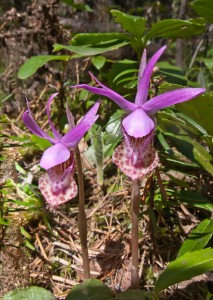 What have I missed at the Homestead today while I have busily picked away at my to-do list? What egg hatched today, what track was left in the soft mud as a sign of the community I still sit on the periphery of? What new flower bloomed that I need to learn? What berry was set?
What have I missed at the Homestead today while I have busily picked away at my to-do list? What egg hatched today, what track was left in the soft mud as a sign of the community I still sit on the periphery of? What new flower bloomed that I need to learn? What berry was set?
So much happens each day in the woods and the fact that I am not there to witness it leaves me with a deep feeling of loss, even if I don’t know what it is I am missing. When I go for hike up at the Homestead and see the round leaved orchids blooming it is like stumbling across a hidden treasure and I greedily want more. I want lupine and larkspur to tumble down the hillsides like a blue steam of water. I want to say I was there when the ravens fledged from the nests, that I saw the eagle teaching its young to fly. It breaks my heart knowing that a bear might be crossing the meadow and all I will have of his passing is pile of dried scat. It makes me ache to think that a bobcat might be stalking a snow shoe hare in the tangle of brush by the old cabin and I will go to my grave never having seen a bobcat in the wild.
No matter how many round leaved orchids or mountain lion tracks I find, I will always wonder what I missed. What I missed paying bills or grocery shopping or doing laundry or even being off somewhere else entirely, on a trip to experience other wonders. I even ache for the week I was in the Big Horns seeing alpine fields of scarlet geraniums and a moose and her baby in the Lamar Valley. Because something equally miraculous was happening at the Homestead and I missed it.
Every walk in the woods is an unfolding of new discoveries. It is easy in our complacency to see what we know, what we have names for. There are the glacier lilies, a shooting star, the leaves of a lupine sprouting in the spring wet ground. There are the first green bristles of the larch, the cones being plucked from the Douglas Fir by the greedy squirrels. We take comfort from seeing these things that we expect to see, feel a certain smugness and self-satisfaction in being able to identify them, maybe even say their names, narrow them to species.
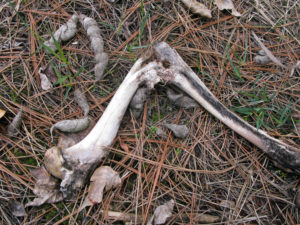 But these are not the things that bring revelation. Revelation comes when you stumble across the scattered bones of a half eaten deer and see the white hairy scat of the coyote and you remember the night, just a few nights ago, when you heard the yipping which increased in tempo, when you could almost hear the keening of celebration and death in the long crescendos of the howling and you know you are standing on sacred ground where one life fed many others and was transformed.
But these are not the things that bring revelation. Revelation comes when you stumble across the scattered bones of a half eaten deer and see the white hairy scat of the coyote and you remember the night, just a few nights ago, when you heard the yipping which increased in tempo, when you could almost hear the keening of celebration and death in the long crescendos of the howling and you know you are standing on sacred ground where one life fed many others and was transformed.
Revelation comes when you see a track in the muddy ground that you cannot name, but you follow it anyway and find the logs where it disappears, only to search for the place where it comes out the other side, bobbing and weaving across the meadow like a drunkard. Then you find where they stop abruptly in scuffled ground near the base of a tree. And you can only guess at the end of the story. An ending that came with the beat of silent wings or a leap of faith up the tree trunk to safety.
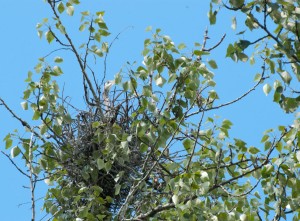 A long walk in the backwoods, across the stagnant water still sitting in the channel behind the fence–leftover from the spring runoff–now nothing more than a mucky breeding ground for mosquitoes. Out to the pond which lays still and murky. Not even a water skipper to riffle it’s surface. Reflecting the grey cloudy sky, it looks like an empty hole in the field. Walking across the grassy meadow above it, the sky is silent in the muggy midday heat. No sign of the redtail hawk soaring overhead. No sound of chickadees or meadowlarks or even the plaintive keening of the mourning doves. The grass stands brown and brittle not even twitching in the heavy air. Even the heron rookery is quiet, the only sign of life a beak sticking out of one deep nest, barely visible even with binoculars through the thick net of cottonwood leaves.
A long walk in the backwoods, across the stagnant water still sitting in the channel behind the fence–leftover from the spring runoff–now nothing more than a mucky breeding ground for mosquitoes. Out to the pond which lays still and murky. Not even a water skipper to riffle it’s surface. Reflecting the grey cloudy sky, it looks like an empty hole in the field. Walking across the grassy meadow above it, the sky is silent in the muggy midday heat. No sign of the redtail hawk soaring overhead. No sound of chickadees or meadowlarks or even the plaintive keening of the mourning doves. The grass stands brown and brittle not even twitching in the heavy air. Even the heron rookery is quiet, the only sign of life a beak sticking out of one deep nest, barely visible even with binoculars through the thick net of cottonwood leaves.
I head back toward the pond, my eyes searching for new blooms of wildflowers, but the only color in the grass is the noxious leafy spurge. My mind drifts, finding nothing interesting to settle on and pretty soon my thoughts are already far away, worrying and planning. Nothing. There is nothing worth writing about today, no insights, no connections, no revelations. Only my bare ankles being rubbed by the toxic leaves of the knapweed, raising tiny itchy welts.
I bend down to scratch them and then suddenly, out of the sky the bright flash of something dropping to the grass two feet from my nose. I look up to see the low flying W wings of an osprey circle once, then head back towards the river. And there, in the grass is the silvery fish, an offering to the writer starved for a subject.